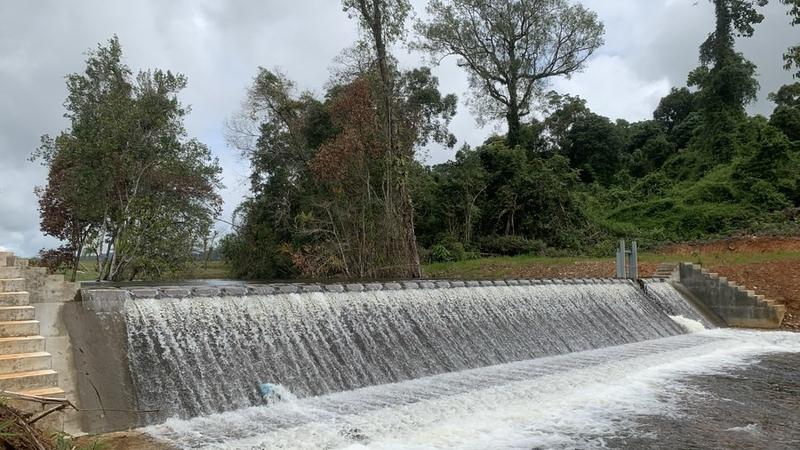 This photo taken on June 19, 2023 shows an overflow dam under a demonstration project funded by the Lancang-Mekong Cooperation (LMC) Special Fund in Thma Bang district of Koh Kong province, Cambodia. (PHOTO / XINHUA)
This photo taken on June 19, 2023 shows an overflow dam under a demonstration project funded by the Lancang-Mekong Cooperation (LMC) Special Fund in Thma Bang district of Koh Kong province, Cambodia. (PHOTO / XINHUA)
The Lancang-Mekong Cooperation framework has created substantial benefits for countries along the river and their people, setting a model for win-win cooperation, officials and experts say.
“The six Lancang-Mekong countries share one river and have forged a community of shared future with close bond as one family,” Han Zhiqiang, Chinese ambassador to Thailand, said at a forum in Bangkok on March 23.
Noting that the cooperation mechanism was formed based on the spirit of “development first, equal consultation, pragmatism and efficiency, and openness and inclusive”, Han said the six countries have achieved fruitful results in economic development, improvement of people’s livelihoods, law enforcement and security, and people-to-people exchanges.
China and five Mekong River countries celebrated the Lancang-Mekong Week during March 18-24 as this year marks the eighth anniversary of the Lancang-Mekong Cooperation, or LMC. Thailand is the co-chair of the LMC this year.
More than 80 events, including Lancang-Mekong water resources cooperation seminar and field trips, green and low-carbon policy roundtable and practice activities, and wetland conservation and management forum, were held during the week, according to the Chinese Foreign Ministry.
Originating from China’s Qinghai-Xizang Plateau, the Lancang River, known as the Mekong River outside China, stretches for nearly 5,000 kilometers across Cambodia, Laos, Myanmar, Thailand and Vietnam.
To enhance cooperation and promote joint development, the LMC was jointly launched by China and its five Southeast Asian neighbors in 2016 as a new type of sub-regional framework to build a community of shared future of peace and prosperity.
Regional leaders lauded the cooperation framework. Sok Chenda Sophea, Cambodia’s deputy prime minister and foreign minister, said on March 19 that the LMC has reached new heights and become an effective model for win-win cooperation.
Despite growing geopolitical uncertainty, volatility and complexity, the LMC framework remains on its practical path, Chenda Sophea said, adding that the LMC Special Fund remains a crucial financing instrument for new projects.
In an interview with Xinhua News Agency, Ohnmar Khine, a deputy director from Myanmar's Ministry of Foreign Affairs, noted the focus of the LMC model on regional integration and its significance in steering countries away from Cold War mentalities, highlighting the LMC’s success in fostering unity, mutual understanding and development among members.
“For the last eight years, the LMC has transformed the region into a region of peace, development and prosperity,” said Thong Mengdavid, a research fellow at the Mekong Centre for Strategic Studies at the Asian Vision Institute, a think tank based in Phnom Penh, Cambodia.
Mengdavid told China Daily that cooperation frameworks like the LMC and Belt and Road Initiative have benefited Cambodia in all aspects, with projects such as hydropower plants, rural water delivery infrastructure and airports being solid examples.
“Regional collaboration is the key for mutual trust and confidence-building between the Mekong countries to unlock more cooperative potential to conserve the river for future generation,” said Mengdavid.
“The Lancang-Mekong cooperation not only benefits (participating countries) in terms of water management, but also through economic cooperation,” said Phung Duc Tung, director of the Mekong Development Research Institute in Hanoi.
Noting that many people in the Mekong Delta rely on the waterway to make a living, Tung told China Daily that it is important for member countries to engage in deeper discussion on joint water management to make the framework mutually beneficial.
As climate change will greatly affect the region’s poor population, especially those relying on forestry and agricultural resources, Phouphet Kyophilavong, dean of the Faculty of Economics and Business Management at the National University of Laos in Vientiane, said he hopes the LMC countries can enhance their cooperation to support the poor while promoting sustainable development.
“The LMC is a very good initiative and China is providing support for Lancang-Mekong countries to do different projects,” Phouphet told China Daily.
Noting that Thailand has put forward the idea of “one visa for six countries”, Chinese ambassador Han said people in the Lancang-Mekong River region may be able to fully realize the free flow of cross-border travel in the near future amid deeper regional economic integration.
Yang Wanli in Bangkok contributed to this story.
Contact the writer at kelly@chinadailyapac.com


